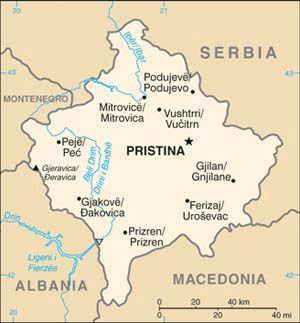Kosovo: Barricades Considered – Analysis
Having eschewed violence and successfully prevented the one-sided outcome in the north pushed by Pristina and its international supporters, the Serbs should now consider removing the barricades at the two main Gates in order to allow a practical test of KFOR and EULEX’s status neutrality.
By Gerard Gallucci
The current tense stalemate in north Kosovo continues. The local Serbs remain on their barricades, building one to take the place of another that KFOR removed, despite the cold weather and coming winter. KFOR says it refuses to use the partial freedom of movement (FOM) offered by the Serbs until EULEX can exercise it as well. The KFOR commander and EULEX deputy chief tried on October 31st to travel together through the barricades, but the EULEX vehicles were not allowed through and they turned back. Given that some KFOR supply convoys reportedly have used the opportunity to go north in the past several days, the attempt by the senior Quint officials to exercise FOM seems to have been a bit of a stunt.

The northern Kosovo Serbs mounted their barricades as a response to the effort by Pristina – initially supported by KFOR and EULEX – to impose its customs controls on the northern boundary between Serbia and Kosovo. The local Serbs see the effort as an attempt to impose a state border between them and Serbia proper. As they reject the independent Kosovo state, they rejected the effort to establish its northern border. The Serbs saw setting barricades as their only way to peacefully protest and prevent KFOR and EULEX from supporting Pristina by transporting its officials back and forth to the crossing points. The locals also began using alternative roads to avoid the “official” crossings. KFOR at times sought to block those in an effort to force the Serbs to use the crossings manned by Kosovo Albanian officials (brought there in KFOR and EULEX helicopters).
To be clear, all activities by KFOR and EULEX to impose Kosovo customs and Pristina’s officials at the boundary crossings were illegal under their UN peacekeeping mandate. The barricades used by the northerners to resist these illegal efforts were well within their right to peacefully resist. Eschewing violence, even when KFOR fired at them, they have successfully prevented the one-sided outcome in the north pushed by Pristina and its international supporters.
It is fair to ask, however, if the barricades remain necessary. The northerners have successfully made the case that the question of the north will not be settled by force. There is increasing recognition that something more more be done than simply trying to impose Pristina’s control in the north. It even may be that KFOR and EULEX are ready to accept some neutral formula on customs.
So, perhaps, it is a good moment to bring down the barricades at the two main Gates. This would allow a practical test of KFOR and EULEX status neutrality. If no effort was made to collect Kosovo customs at the Gates, there would be no need to remount any barricades. Even if EULEX allowed Kosovo police and customs officers to be at the Gates, as long as they did not seek to control or collect fees there, they could be ignored. And if they did try to collect fees at the Gates, the locals could simply go around. In other words, it might be worth thinking about treating the boundary crossings as if they were not there rather than continuing to block them. This would allow KFOR and EULEX room to return to peacekeeping and their UN mandate without rubbing their nose in their inability to force surrender. It would also relieve pressure on the northerners themselves and on Belgrade.
The barricades along the Ibar may be another matter. The Serbs may find them still necessary to be able to prevent any new unilateral incursions by the Kosovo Albanians until KFOR accepts its responsibility to prevent such, rather than ferry ROSU north by helicopter as it did in July.
Gerard M. Gallucci is a retired US diplomat and UN peacekeeper. He worked as part of US efforts to resolve the conflicts in Angola, South Africa and Sudan and as Director for Inter-American Affairs at the National Security Council. He served as UN Regional Representative in Mitrovica, Kosovo from July 2005 until October 2008 and as Chief of Staff for the UN mission in East Timor from November 2008 until June 2010. Gerard is also a member of TransConflict’s Advisory Board.
